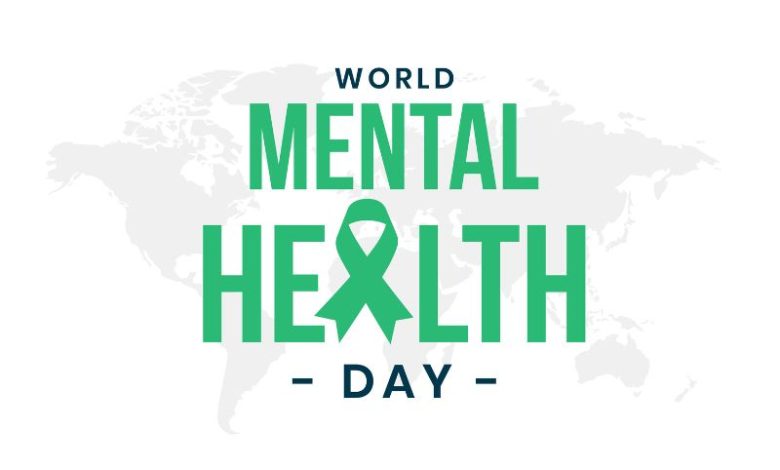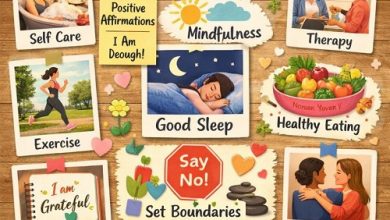World Mental Health Day 2025: 10 Ways to Support Your Mental Well-being Today

Every year on October 10, the world unites to observe World Mental Health Day, a day dedicated to raising awareness about mental health challenges, fighting stigma, and promoting better mental well-being for all. The theme for World Mental Health Day 2025 continues to emphasize “Mental Health is a Universal Human Right”, a reminder that everyone, everywhere, deserves access to quality mental health care and support.
In a fast-paced world filled with stress, digital overload, and uncertainty, nurturing mental health has become just as vital as caring for physical health. Whether you’re struggling with anxiety, burnout, or simply seeking ways to enhance your emotional balance, this article outlines 10 practical and science-backed ways to support your mental well-being today.
10 Ways to Support Your Mental Well-being
1. Prioritize Restful Sleep
Sleep is one of the most overlooked pillars of mental health. Studies show that inadequate or poor-quality sleep can increase irritability, anxiety, and depression while reducing focus and resilience.
Tips for Better Sleep
- Set a consistent schedule: Go to bed and wake up at the same time daily — even on weekends.
- Limit screen time: Turn off digital devices at least an hour before bed.
- Create a relaxing routine: Try meditation, reading, or light stretching before sleep.
- Optimize your environment: Keep your bedroom dark, quiet, and cool.
Getting 7–9 hours of quality sleep every night helps the brain recharge, process emotions, and strengthen cognitive function — all crucial for mental well-being.
2. Practice Mindfulness and Meditation
Mindfulness means being fully present in the moment — noticing your thoughts and feelings without judgment. It’s a proven method for reducing stress, improving emotional regulation, and enhancing overall happiness.
Simple Mindfulness Practices
- Start small: Spend 5 minutes each morning focusing on your breathing.
- Mindful eating: Pay attention to the flavors, textures, and sensations of your food.
- Grounding exercises: Use the 5-4-3-2-1 technique to anchor yourself in the present — identify 5 things you can see, 4 you can touch, 3 you can hear, 2 you can smell, and 1 you can taste.
Regular mindfulness or meditation practice can rewire your brain, promoting calmness and clarity even in stressful situations.
3. Stay Physically Active
Physical activity is not just about staying fit — it’s a cornerstone of mental health. Exercise releases endorphins, the body’s natural “feel-good” chemicals, and reduces levels of stress hormones like cortisol.
Ways to Get Moving
- Take daily 30-minute walks or short stretching breaks.
- Join a yoga, dance, or aerobics class.
- Try outdoor activities like hiking, cycling, or gardening.
Even light exercise three times a week can significantly improve mood, energy, and confidence — while reducing anxiety and depression symptoms.
4. Build Strong Social Connections
Humans are inherently social beings, and meaningful connections can provide emotional stability and reduce loneliness. On World Mental Health Day 2025, take time to reach out to someone — a friend, family member, or colleague — and check in.
How to Strengthen Relationships
- Stay connected: Schedule regular catch-ups, even virtually.
- Join community groups: Volunteering or group activities foster belonging.
- Be a good listener: Offer empathy and support without judgment.
Social interaction builds resilience and reminds us that we are not alone in our struggles.
5. Limit Screen Time and Social Media Use
While technology connects us, excessive use — especially of social media — can harm mental well-being. Comparing your life to filtered highlights of others can fuel stress, anxiety, and low self-esteem.
Healthy Digital Habits
- Set boundaries: Allocate specific times for checking messages or social platforms.
- Use digital detoxes: Try spending one day each week offline.
- Follow positive content: Surround yourself with inspiring, educational, or uplifting pages.
Balancing your digital life creates more space for real-life interactions and self-reflection.
6. Nourish Your Mind with a Healthy Diet
What you eat directly affects how you feel. A nutrient-rich diet supports brain function and stabilizes mood. Research shows that diets high in fruits, vegetables, whole grains, and omega-3 fatty acids are linked to lower risks of depression and anxiety.
Foods for Mental Well-being
- Omega-3s: Found in fish, chia seeds, and walnuts — enhance brain health.
- B vitamins: Found in leafy greens, eggs, and legumes — reduce fatigue and stress.
- Antioxidants: Found in berries and dark chocolate — protect brain cells.
Avoid excessive caffeine, sugar, and processed foods, which can trigger energy crashes and mood swings.
7. Seek Professional Help When Needed
One of the most courageous steps in maintaining mental well-being is seeking professional support. Just as you’d visit a doctor for a physical illness, reaching out to a therapist, counselor, or psychiatrist is a healthy, proactive choice.
When to Seek Help
- Persistent sadness or hopelessness
- Difficulty concentrating or functioning daily
- Intense anxiety or panic attacks
- Withdrawal from loved ones or activities
- Thoughts of self-harm
Therapy provides a safe space to understand emotions, develop coping strategies, and foster healing. Remember: seeking help is not a weakness — it’s a strength.
8. Practice Gratitude and Positive Thinking
Focusing on gratitude helps shift attention from what’s lacking to what’s present and good. Regular gratitude practice has been shown to boost happiness, optimism, and emotional resilience.
Ways to Cultivate Gratitude
- Keep a gratitude journal: Write down three things you’re thankful for each day.
- Express appreciation: Say thank you or send a message to someone who helped you.
- Reframe challenges: View difficulties as opportunities for growth.
Positivity doesn’t mean ignoring problems — it means choosing to focus on hope and solutions.
9. Engage in Creative or Meaningful Activities
Creative expression — whether through art, music, writing, or gardening — can be deeply therapeutic. It helps channel emotions constructively and promotes relaxation.
Ideas for Creative Well-being
- Paint, draw, or color mindfully.
- Write in a journal or try poetry.
- Play an instrument or listen to soothing music.
- Take up DIY projects or crafts.
Engaging in hobbies you love gives a sense of accomplishment and purpose, both vital for mental health.
10. Create a Work-Life Balance
In today’s always-on culture, many people struggle to separate personal life from work. Chronic overworking leads to burnout — emotional exhaustion, detachment, and decreased productivity.
Steps to Improve Balance
- Set boundaries: Avoid checking work emails after hours.
- Take breaks: Short pauses throughout the day can rejuvenate focus.
- Use your leave: Rest is not a luxury — it’s a necessity.
- Practice self-care: Engage in relaxing activities like reading, walking, or spending time with loved ones.
A balanced life allows you to recharge mentally and physically, making you more creative and effective in everything you do.
Why World Mental Health Day 2025 Matters
World Mental Health Day isn’t just a symbolic event — it’s a global movement for compassion and change. Despite growing awareness, millions still lack access to proper care due to stigma, poverty, or limited resources. According to the World Health Organization (WHO), depression is now one of the leading causes of disability worldwide.
By observing this day, communities, workplaces, and individuals can:
- Encourage open conversations about mental health.
- Educate others on the importance of early intervention.
- Advocate for policies that ensure mental health support for all.
The theme “Mental Health is a Universal Human Right” reminds us that emotional wellness should never be a privilege — it’s something every person deserves.
How Organizations Can Support Mental Health
Employers, schools, and governments play a vital role in promoting mental wellness. Here are actionable ways organizations can contribute:
In Workplaces
- Implement mental health policies and awareness programs.
- Offer Employee Assistance Programs (EAPs) for counseling support.
- Encourage flexible working hours and healthy workloads.
- Create safe spaces for open discussion and peer support.
In Schools and Universities
- Provide mental health education from an early age.
- Train teachers to recognize signs of emotional distress.
- Offer on-campus counseling and peer-support initiatives.
In Communities
- Support local mental health organizations and helplines.
- Organize awareness events, workshops, or campaigns.
- Encourage community dialogue to eliminate stigma.
By building supportive environments, we empower people to seek help and thrive.
The Role of Technology in Mental Health
Technology can be both a challenge and a tool for mental wellness. While excessive screen use can contribute to stress, several digital tools now make therapy and mindfulness more accessible.
Helpful Digital Resources
- Meditation apps: Headspace, Calm, Insight Timer.
- Online therapy platforms: BetterHelp, Talkspace.
- Mood tracking apps: Daylio, Moodfit.
These tools provide convenience and privacy for those who might feel hesitant to seek in-person support.
Self-Care: A Daily Commitment, Not a Luxury
Supporting your mental well-being isn’t something you do once a year — it’s a daily practice. Self-care doesn’t always mean spa days or vacations; it’s the consistent, small actions that nurture your body and mind.
Simple Everyday Self-Care Ideas
- Drink enough water.
- Spend time in nature.
- Journal your thoughts or emotions.
- Practice breathing exercises during stressful moments.
- Say “no” when you’re overwhelmed — boundaries protect peace.
Breaking the Stigma
Despite progress, mental health stigma remains a major barrier to care. Misconceptions — like “mental illness is a sign of weakness” — can prevent people from speaking up. World Mental Health Day 2025 is a reminder to replace judgment with empathy.
You can help break the stigma by:
- Talking openly about your experiences.
- Using kind and respectful language.
- Encouraging loved ones to seek help.
- Supporting mental health initiatives and charities.
The more we talk, the more we normalize — and the more lives we save.
Final Thoughts: Your Mental Health Matters
On World Mental Health Day 2025, take a moment to reflect on your mental well-being. Just as you’d care for your physical health, make your emotional health a priority — every day.
Supporting mental well-being doesn’t require drastic change. It’s about small, intentional steps — getting enough rest, reaching out to others, being kind to yourself, and asking for help when needed.




